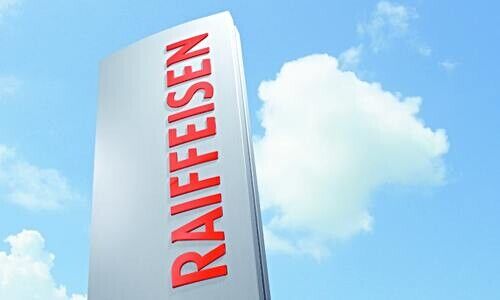After the takeover of Credit Suisse, cooperative banks reluctantly found themselves thrust into Swiss banking's number two role. In a business dominated by major banks, Raiffeisen has ambitions.
In a recent interview, Heinz Huber (pictured below) said the Raiffeisen Group has no interest in becoming an international player like UBS and Credit Suisse. «We don't want to be a big bank,» said the CEO of Raiffeisen Switzerland, the country's largest mortgage bank.
Even so, the group's moving into the number two slot in Swiss banking after the demise of Credit Suisse is grudgingly acknowledged, which isn't to say that Huber's not aiming high in some areas.
A Medium-sized Private Bank

(Image: Raiffeisen)
The group made up of 219 individual institutions is preparing to make its mark in asset management, an area dominated by UBS and Credit Suisse.
Raiffeisen Group attracted 1.8 billion Swiss francs of new custody assets in the first half of the year. With client assets under management of 246.6 billion francs, it's equivalent to the portfolio of a medium-sized Swiss private bank. Driven by asset management, net income from commission and service fees rose to 310.9 million francs.
Over Half a Million Custody Accounts
There's more to come. «In the first half of the year, we passed the mark of half a million custody accounts. With 3.65 million customers, I still see some potential,» Huber told finews.com at a conference.
Compared to UBS, which netted $15.3 billion of client assets in Switzerland in the past second quarter alone, Raiffeisen's volumes look tiny. The Group reoriented its wealth business following a strategic turnaround when it sold its private banking subsidiary, Notenstein La Roche, and relaunched its mandate offerings four years ago.
Low Entry Thresholds
Two aspects of Raiffeisen's new money should give the market leader pause. One is the dynamism the investment and pension business is showing, as 16,600 accounts were opened in the first six months of the year, while asset management mandates saw 15.6 percent growth.
Then there's the money's source. Mandates are available from Raiffeisen for as little as 50,000 francs; in the case of the «Rio» digital asset management service, the minimum investment is 5,000 francs targeted at «affluents.»
Cracked the Market?
Raiffeisen wealth management's results suggest cooperative members succeeded in cracking a notoriously difficult market.
Other banks have been trying to accomplish that for years. If consulting firms like Oliver Wyman are to be believed, the potential in private banking for the masses is enormous, By 2026, the market is expected to generate revenue streams of $45 billion globally, and in four years, two-thirds of all private banking revenue could come from the affluents.
Rolling up From Below
Challenges remain, however, because it's quite difficult for large asset managers with expensive structures to gain a profitable foothold. Raiffeisen's advantage lies in being able to approach the affluent market from the bottom. With its enormous retail banking reach, it knows its customers long before they're wealthy. When assets come into play upon retirement, inheritance, or the sale of a house or company, clients are already in the door.
Still, it's not quite that simple. «We've invested a lot in consulting,» says Huber. «We want to ensure a basic understanding of issues among customers so decisions are made together.»
New Products in High Gear
Rapid investments were made in products and services. The Group launched Rio digital asset management in 2020, and a digital pillar 3a pension offering was integrated into e-banking the following year. Last year, the product range was expanded with sustainable index-tracking funds, with around 95 percent of Raiffeisen's fund volume invested sustainably.
Huber attributes the rapid growth in recent months to this groundwork. «We focus on investment solutions that are easy to understand and geared to the needs of our customers, which are already available for small assets.»




































